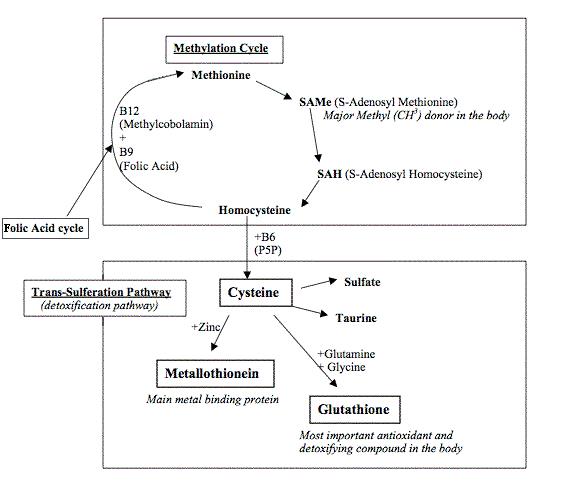Those who are canny will recognize that homocysteine levels can be elevated by taking levodopa, and this may lead to unwanted health side effects. (There are things you can do to mitigate this.)
However, does mean that homocysteine is just bad? Maybe not.
Have a peek the interconnected Methylation cycle and trans-sulfuration pathway:
I didn't realize until I saw this image that homocysteine is involved in one pathway for the formation of cysteine, which is itself a precursor to the a master antioxidant glutathione. Some PWP's try to supplement glutathione either directly or by taking NAC (n-acetyl-cysteine). If homocysteine plays role in methionine metabolism and glutathione synthesis, maybe it is a friend?
Here's the abstract of an article that talks about his two functions that homocysteine plays. pubs.acs.org/doi/10.1021/bi...
And here is a somewhat more accessible discussion on the topic of
Homocysteine: friend or foe?
ncbi.nlm.nih.gov/pmc/articl...
"I have watched with interest as the recommended maximum “safe” levels have dropped several times through the past 2 decades as research has progressed. Several months ago, one of the thought leaders in nutritional medicine recommended, at a lecture I attended, that homocysteine should be less than 6 mg/L. I found this intriguing and likely very difficult to attain. Then as I was studying the biochemistry of glutathione for my editorial in February 2014,1 I couldn’t help but notice the homocysteine/methylation cycle, right in the middle of a lot of metabolism. It got me to wondering if, like cholesterol (see my editorial from June 2014),2 perhaps we were inappropriately vilifying a molecule important for health.
"Initially, it looked to me like homocysteine might be an important storage/transfer molecule and the factors that cause its elevation are the actual problem, not the homocysteine itself."
I am currently looking at supplementing with methylfolate (a friendlier version of folic acid) and vitamin B12. These may help the conversion of homocysteine to methionine.
As I was looking to find what a good dose would be, I found this article which talks about vitamin B12 levels and homocysteine levels in patients with early Parkinson's:
Vitamin B12 Supplements May Help Slow Parkinson’s Progression, Study Finds
parkinsonsnewstoday.com/201...
What do you think?
